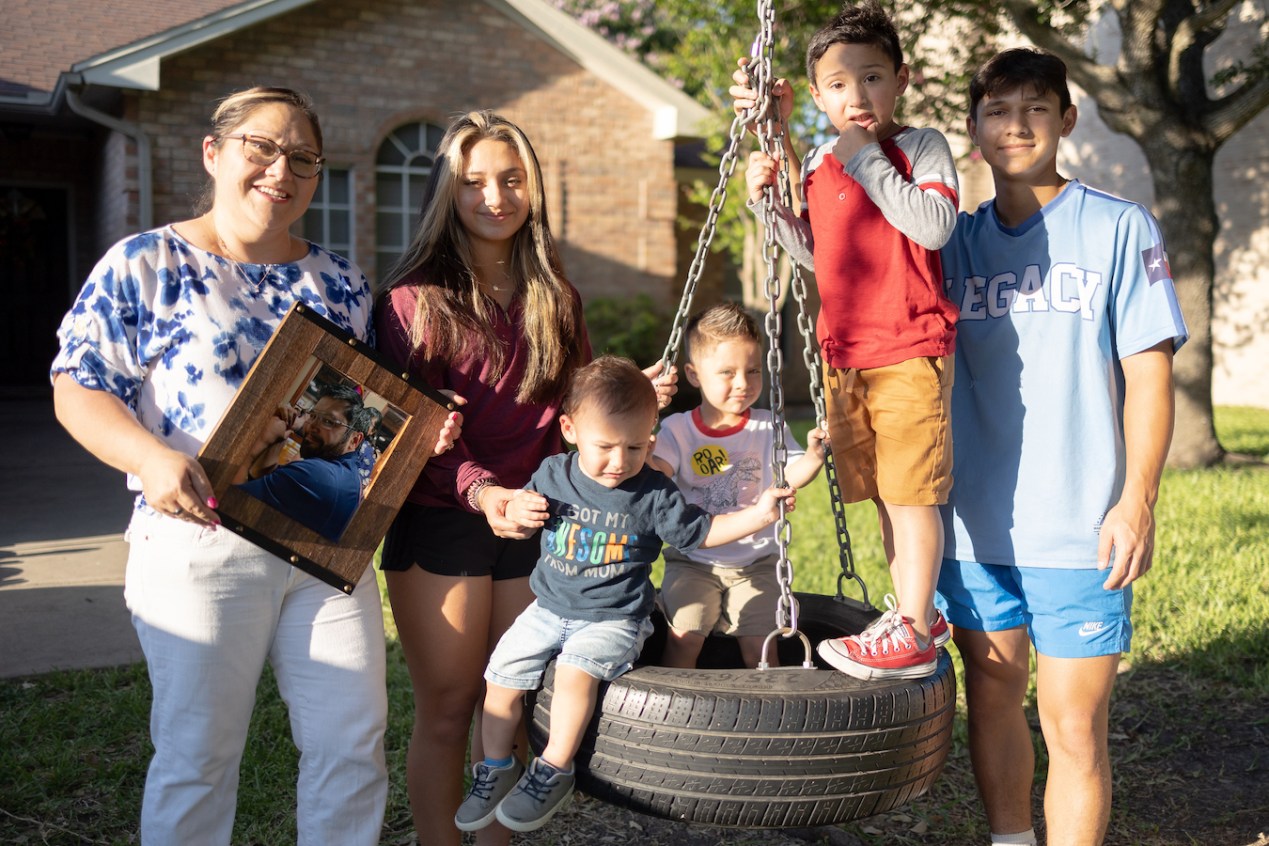Five months after her husband died of covid-19, Valerie Villegas can see how grief has wounded her children.
Nicholas, the baby, who was 1 and almost weaned when his father died, now wants to nurse at all hours and calls every tall, dark-haired man “Dada,” the only word he knows. Robert, 3, regularly collapses into furious tantrums, stopped using the big-boy potty and frets about sick people giving him germs. Ayden, 5, recently announced it’s his job to “be strong” and protect his mom and brothers.
Her older kids — Kai Flores, 13, Andrew Vaiz, 16, and Alexis Vaiz, 18 — are often quiet and sad or angry and sad, depending on the day. The two eldest, gripped by anxiety that makes it difficult to concentrate or sleep, were prescribed antidepressants soon after losing their stepfather.
“I spend half the nights crying,” said Villegas, 41, a hospice nurse from Portland, Texas. She became a widow on Jan. 25, just three weeks after Robert Villegas, 45, a strong, healthy truck driver and jiujitsu expert, tested positive for the virus.
“My kids, they’re my primary concern,” she said. “And there’s help that we need.”
But in a nation where researchers calculate that more than 46,000 children have lost one or both parents to covid since February 2020, Villegas and other survivors say finding basic services for their bereaved kids — counseling, peer support groups, financial assistance — has been difficult, if not impossible.
“They say it’s out there,” Villegas said. “But trying to get it has been a nightmare.”
Interviews with nearly two dozen researchers, therapists and other experts on loss and grief, as well as families whose loved ones died of covid, reveal the extent to which access to grief groups and therapists grew scarce during the pandemic. Providers scrambled to switch from in-person to virtual visits and waiting lists swelled, often leaving bereft children and their surviving parents to cope on their own.
“Losing a parent is devastating to a child,” said Alyssa Label, a San Diego therapist and program manager with SmartCare Behavioral Health Consultation Services. “Losing a parent during a pandemic is a special form of torture.”
Children can receive survivor benefits when a parent dies if that parent worked long enough in a job that required payment of Social Security taxes. During the pandemic, the number of minor children of deceased workers who received new benefits has surged, reaching nearly 200,000 in 2020, up from an average of 180,000 in the previous three years. Social Security Administration officials don’t track cause of death, but the latest figures marked the most awards granted since 1994. Covid deaths “undoubtedly” fueled that spike, according to the SSA’s Office of the Chief Actuary.
And the number of children eligible for those benefits is surely higher. Only about half of the 2 million children in the U.S. who have lost a parent as of 2014 received the Social Security benefits to which they were entitled, according to a 2019 analysis by David Weaver of the Congressional Budget Office.
Counselors said they find many families have no idea that children qualify for benefits when a working parent dies, or don’t know how to sign up.
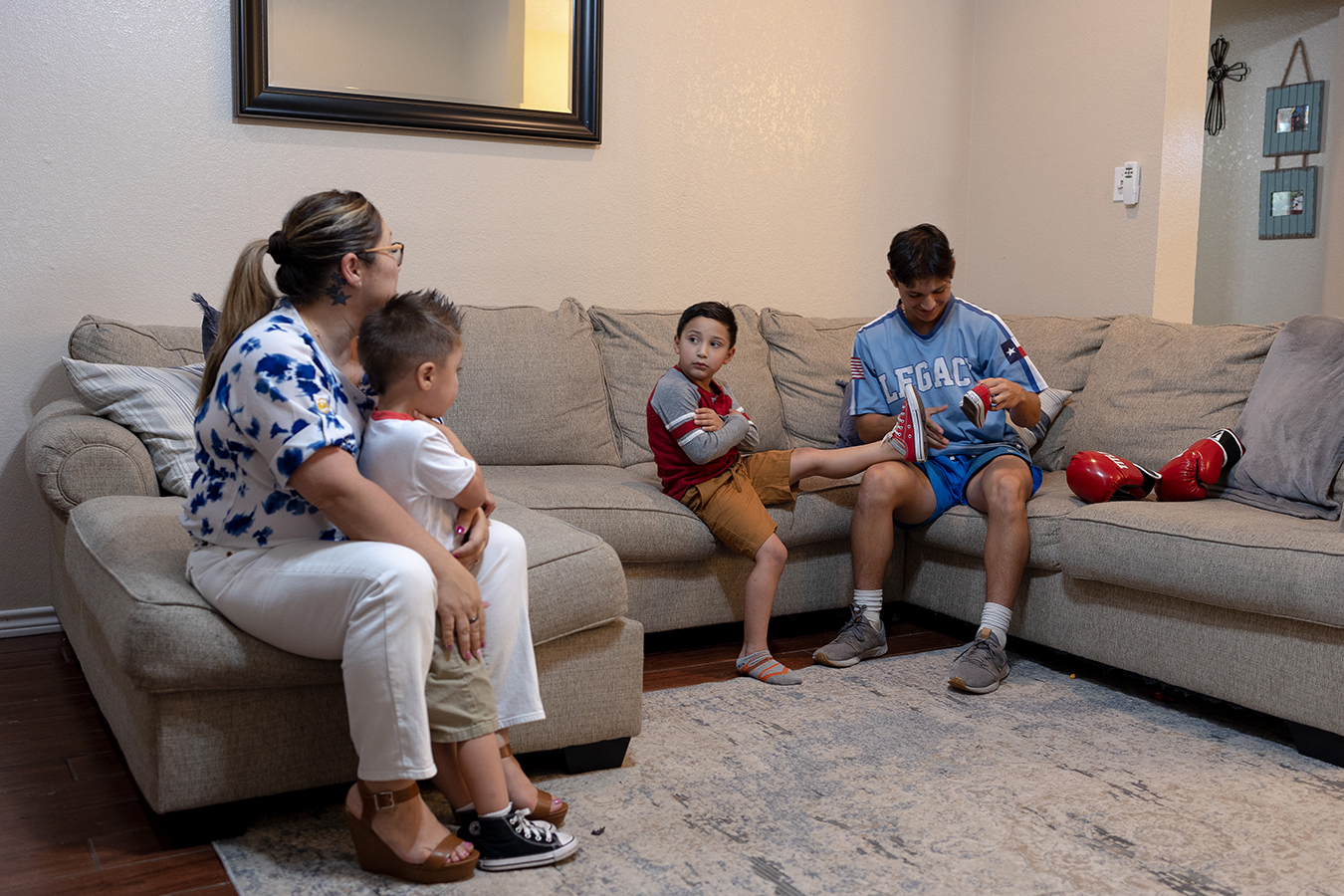
In a country that showered philanthropic and government aid on the 3,000 children who lost parents to the 9/11 terror attacks, there’s been no organized effort to identify, track or support the tens of thousands of kids left bereaved by covid.
“I’m not aware of any group working on this,” said Joyal Mulheron, the founder of Evermore, a nonprofit foundation that focuses on public policy related to bereavement. “Because the scale of the problem is so huge, the scale of the solution needs to match it.”
Covid has claimed more than 600,000 lives in the U.S., and researchers writing in the journal JAMA Pediatrics calculated that for every 13 deaths caused by the virus, one child under 18 has lost a parent. As of June 15, that would translate into more than 46,000 kids, researchers estimated. Three-quarters of the children are adolescents; the others are under age 10. About 20% of the children who’ve lost parents are Black, though they make up 14% of the population.
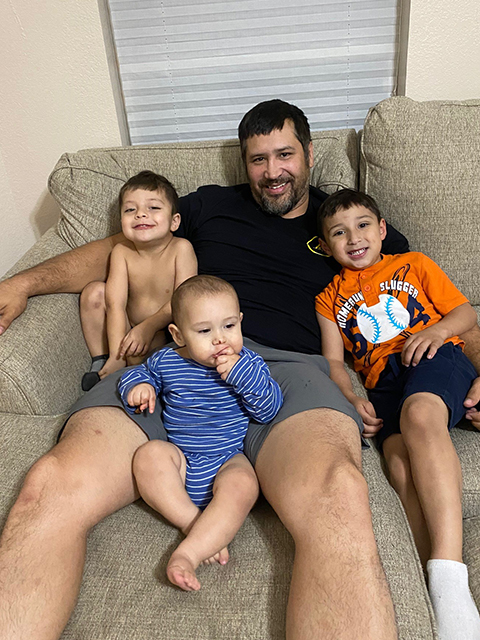
“There’s this shadow pandemic,” said Rachel Kidman, an associate professor at Stony Brook University in New York, who was part of the team that found a way to calculate the impact of covid deaths. “There’s a huge amount of children who have been bereaved.”
The Biden administration, which launched a program to help pay funeral costs for covid victims, did not respond to questions about offering targeted services for families with children.
Failing to address the growing cohort of bereaved children, whether in a single family or in the U.S. at large, could have long-lasting effects, researchers said. The loss of a parent in childhood has been linked to higher risks of substance use, mental health problems, poor performance in school, lower college attendance, lower employment and early death.
“Bereavement is the most common stress and the most stressful thing people go through in their lives,” said clinical psychologist Christopher Layne of the UCLA/Duke University National Center for Child Traumatic Stress. “It merits our care and concern.”
Perhaps 10% to 15% of children and others bereaved by covid might meet the criteria of a new diagnosis, prolonged grief disorder, which can occur when people have specific, long-lasting responses to the death of a loved one. That could mean thousands of children with symptoms that warrant clinical care. “This is literally a national, very public health emergency,” Layne said.
Still, Villegas and others say they have been left largely on their own to navigate a confusing patchwork of community services for their children even as they struggle with their own grief.
“I called the counselor at school. She gave me a few little resources on books and stuff,” Villegas said. “I called some crisis hotline. I called counseling places, but they couldn’t help because they had waiting lists and needed insurance. My kids lost their insurance when their dad died.”
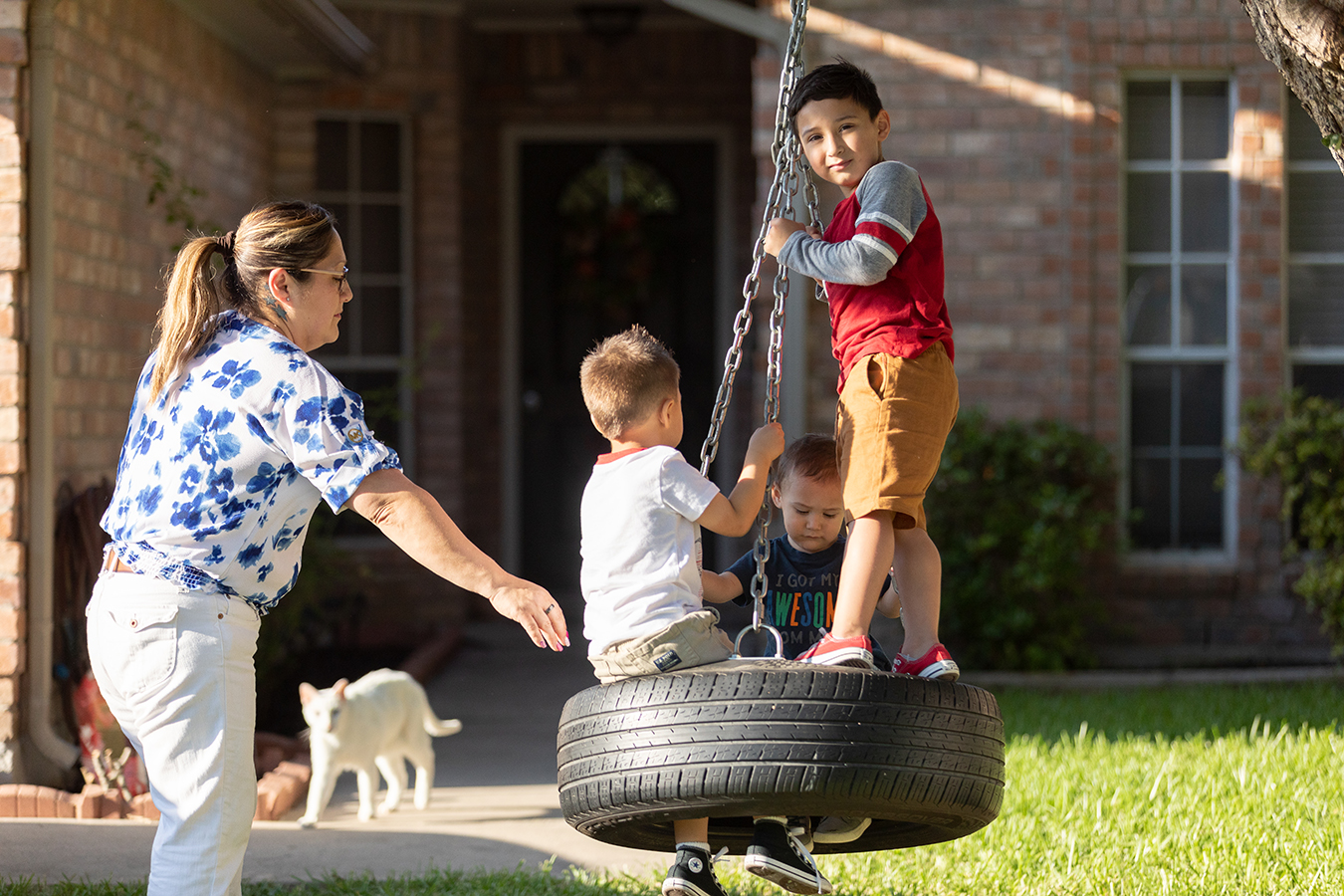
The social disruption and isolation caused by the pandemic overwhelmed grief care providers, too. Across the U.S., nonprofit agencies that specialize in childhood grief said they have scrambled to meet the need and to switch from in-person to virtual engagement.
“It was a huge challenge; it was very foreign to the way we work,” said Vicki Jay, CEO of the National Alliance for Grieving Children. “Grief work is based on relationships, and it’s very hard to get a relationship with a piece of machinery.”
At Experience Camps, which each year offers free weeklong camps to about 1,000 bereaved kids across the country, the waiting list has grown more than 100% since 2020, said Talya Bosch, an Experience Camps associate. “It is something that we are concerned about — a lot of kids are not getting the support they need,” she said.
Private counselors, too, have been swamped. Jill Johnson-Young, co-owner of Central Counseling Services in Riverside, California, said her nearly three dozen therapists have been booked solid for months. “I don’t know a therapist in the area who isn’t full right now,” she said.
Dr. Sandra McGowan-Watts, 47, a family practice doctor in Chicago, lost her husband, Steven, to covid in May 2020. She feels fortunate to have found an online therapist for her daughter, Justise, who helped explain why the 12-year-old was suddenly so sad in the mornings: “My husband was the one who woke her up for school. He helped her get ready for school.”
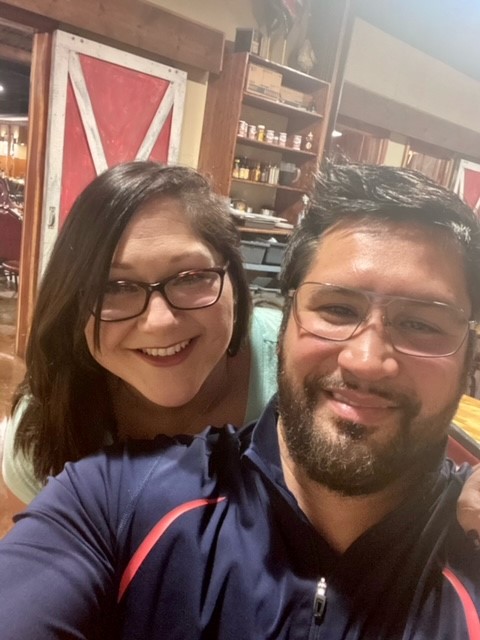
Justise was also able to get a spot at an Experience Camps session this summer. “I am nervous about going to camp, but I am excited about meeting new kids who have also lost someone close in their life,” she said.
Jamie Stacy, 42, of San Jose, California, was connected with an online counselor for her daughter, Grace, 8, and twin sons, Liam and Colm, 6, after their father, Ed Stacy, died of covid in March 2020 at age 52. Only then did she learn that children can grieve differently than adults. They tend to focus on concrete concerns, such as where they’ll live and whether their favorite toys or pets will be there. They often alternate periods of play with sadness, cycling rapidly between confronting and avoiding their feelings of loss.
“The boys will be playing Legos, having a great time, and all of a sudden drop a bomb on you: ‘I know how I can see Daddy again. I just have to die, and I’ll see Daddy again,’” she said. “And then they’re back to playing Legos.”
Stacy said counseling has been crucial in helping her family navigate a world where many people are marking the end of the pandemic. “We can’t escape the topic of covid-19 even for one day,” she said. “It’s always in our face, wherever we go, a reminder of our painful loss.”
Villegas, in Texas, has returned to her work in hospice care and is starting to reassemble her life. But she thinks there should be formal aid and grief support for families like hers whose lives have been indelibly scarred by the deadly virus.
“Now everybody’s lives are going back to normal,” she said. “They can get back to their lives. And I’m thinking my life will never be normal again.”



